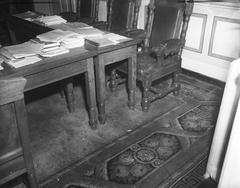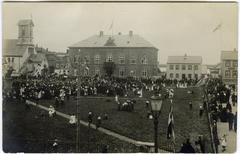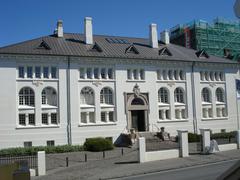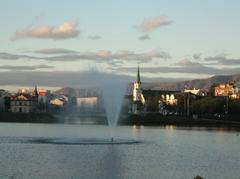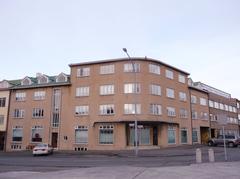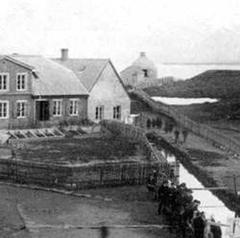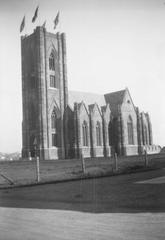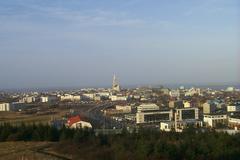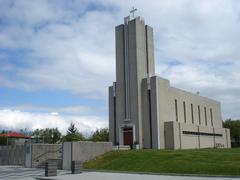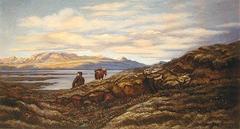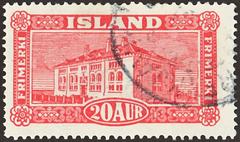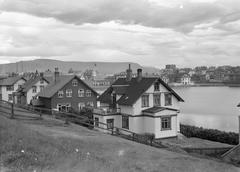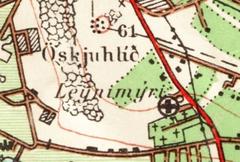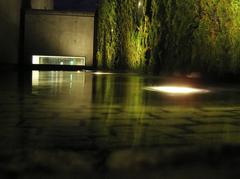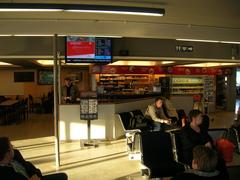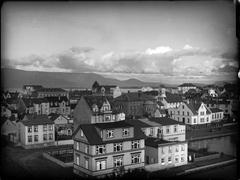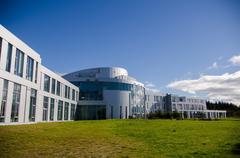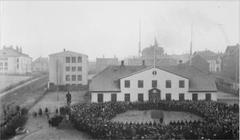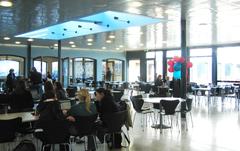Laugardalshöll Reykjavik Iceland: Visiting Hours, Tickets, and Visitor Guide
Date: 14/06/2025
Introduction to Laugardalshöll: History and Cultural Significance
Nestled in Reykjavík’s vibrant Laugardalur district, Laugardalshöll is a monumental symbol of Iceland’s sporting and cultural heritage. Since its inauguration in 1965, this iconic indoor arena has evolved from a multipurpose sports venue into a central hub for international events, historic milestones, and community gatherings. Designed by architects Gísli Halldórsson and Skarphéðinn Jóhannsson, Laugardalshöll embodies modernist architecture, prioritizing functionality, adaptability, and seamless integration with its natural surroundings (Wikipedia).
The arena is renowned for hosting the legendary 1972 World Chess Championship—a Cold War spectacle that drew global attention—and for staging major sporting events such as the 1995 World Men’s Handball Championship and annual cultural celebrations, including Iceland’s Eurovision Song Contest national selection (Guide to Iceland; expoquote.co).
Surrounding the arena, the Laugardalur district blends natural beauty with recreational and cultural attractions, such as the Laugardalslaug geothermal pool, Reykjavík Botanical Garden, and Family Park and Zoo. The area is well-connected and accessible, with pedestrian paths, public transport links, and facilities for visitors with disabilities (Reykjavik.is; Fun Iceland).
This guide provides everything you need to know about Laugardalshöll, including visiting hours, ticketing options, event schedules, travel tips, and nearby attractions—ensuring an enriching experience for all.
Table of Contents
- Historical Development of Laugardalshöll
- Architectural Significance
- Visiting Laugardalshöll: Practical Information
- Laugardalshöll’s Role in Icelandic Culture and Sport
- Visiting Laugardalur in Reykjavík: Attractions and Accessibility
- Discover Laugardalshöll: Tickets and Visitor Experience
- Summary and Call to Action
- References
Historical Development of Laugardalshöll
Origins and Construction
Laugardalshöll, also known as Laugardalshöllin, was conceived in the late 1950s amid Reykjavík’s urban expansion and growing interest in organized sports. The City of Reykjavík and the Reykjavík Sports Association (ÍBR) commissioned the project in 1959, aiming to create a world-class indoor arena reflecting Icelandic values (Wikipedia). Construction began in 1959 but was soon hampered by financial constraints and labor strikes. A major milestone was achieved in September 1963 with the completion of the arena’s distinctive roof vault, and the venue officially opened on December 4, 1965.
Early Use and Expansion
The first event at Laugardalshöll was a handball match between a Reykjavík team and Czech club HCB Karviná, cementing the arena’s status as a sports hub (Guide to Iceland). The design allowed for multiple sports, concerts, and large gatherings. Over the years, renovations expanded seating, improved acoustics, and modernized facilities, with the main hall now accommodating up to 3,000 seated guests (5,500 with standing room) for concerts (Wikipedia; Tripomatic).
Landmark Events
- 1972 World Chess Championship: The iconic Fischer-Spassky match, drawing global attention to Reykjavík during the Cold War (Wikipedia).
- Sporting Milestones: Host to the European Women’s Handball Championship (1970), World Men’s Handball Championship (1995), and home to Iceland’s national basketball and handball teams (Guide to Iceland).
- Cultural and Political Gatherings: Concerts by Led Zeppelin, Metallica, Björk, and others; since 2016, the venue for Söngvakeppnin, Iceland’s Eurovision selection; and site of the 2009 National Assembly for constitutional reform (Wikipedia).
Architectural Significance
Modernist Design and Structure
Laugardalshöll’s architecture exemplifies mid-20th-century modernism, with an expansive column-free roof vault supported by reinforced concrete and steel. The understated exterior blends with the Laugardalur valley, while the adaptable interior features movable seating and modular staging (Wikipedia; Guide to Iceland).
Adaptability and Innovation
The arena can be reconfigured for sports, concerts, exhibitions, and conferences, supported by advanced technical infrastructure. Ongoing upgrades ensure it remains state-of-the-art. An adjacent “national hall” seating up to 8,600 is planned for 2027–2028, further elevating the venue’s status (Wikipedia; Reykjavik.is).
Integration with Laugardalur
Located in Reykjavík’s primary recreational area, the arena is easily accessible and close to attractions like the Laugardalslaug pool, zoo, and botanical gardens (Reykjavik.is; Tripomatic).
Visiting Laugardalshöll: Practical Information
Visiting Hours and Ticketing
Laugardalshöll is open during scheduled events; hours vary by event. Check the event calendar on the official Laugardalshöll website or ticketing platforms such as Tix.is. Advance booking is advised for popular events.
Accessibility
The venue is fully accessible, featuring ramps, elevators, and designated seating. Public transport (buses), ample parking, and pedestrian paths ensure easy access. Facilities cater to visitors with disabilities (Reykjavik.is).
Getting There
Situated in Laugardalur, Laugardalshöll is about 2 km from Reykjavík city center. It’s accessible by bus, car, bicycle, or on foot. Parking is available, though may be limited during high-attendance events.
Nearby Attractions
Explore Laugardalslaug geothermal pool, the Reykjavík Zoo and Family Park, and the Botanical Garden—all within walking distance and ideal for a full day’s outing.
Laugardalshöll’s Role in Icelandic Culture and Sport
National Identity and Iconic Events
Since 1965, Laugardalshöll has shaped Icelandic culture, hosting events that have defined national identity. The 1972 chess championship, major concerts, and political gatherings highlight its cultural importance (expoquote.co).
Concerts, Festivals, and Trade Shows
The venue’s flexibility supports intimate performances, international acts, trade shows, and exhibitions. Notable events include the Iceland Fishing Expo and Reykjavík International Games, which attract global attention (icelandfishexpo.is; rig.is).
Sporting Significance
Serving as the primary site for handball, basketball, and athletics, Laugardalshöll also supports local sports clubs and youth tournaments. Its modern facilities, including the indoor athletics arena, host international events and nurture Icelandic talent (rig.is; ritsyn.is).
Community Impact
Located near major hotels and transport links, Laugardalshöll fosters community by hosting concerts, exhibitions, and citywide events such as Reykjavík’s Culture Night (ritsyn.is; reykjavik.is).
Visiting Laugardalur in Reykjavík: Attractions and Accessibility
Laugardalur District Overview
“Hot Spring Valley,” or Laugardalur, is Reykjavík’s premier recreational and cultural district, historically known for its geothermal heritage (Fun Iceland). Today, it features expansive green spaces, sports facilities, and key public attractions.
Key Attractions
- Laugardalshöll Arena: Multipurpose events and historic significance (Visit Reykjavik).
- Laugardalsvöllur Stadium: Main outdoor sports stadium for football.
- Laugardalslaug Pool: Reykjavík’s largest geothermal pool; open daily (Fun Iceland).
- Reykjavík Family Park and Zoo: Family-friendly, featuring native animals.
- Botanical Garden: Open year-round, with over 5,000 plant species (Nomad Epic).
- Ásmundarsafn Sculpture Museum: Art museum with seasonal hours.
Accessibility and Services
Laugardalur is accessible by bus, car, bicycle, or on foot. Paths are wheelchair- and stroller-friendly, and major attractions meet accessibility standards (Reykjavík Accessibility). The Reykjavík City Card offers entry to pools and museums and covers public transport (Visit Reykjavik).
Discover Laugardalshöll: Tickets and Visitor Experience
Event Profile
Laugardalshöll hosts a wide array of events, including national and international sports, concerts, exhibitions, and e-sports tournaments (Wikipedia).
Ticketing and Visiting Hours
- Tickets: Available via Tix.is and Jambase. Advance purchase is recommended.
- Visiting Hours: Vary by event; doors typically open 1–2 hours prior (ish.is).
Amenities
The arena offers food concessions, accessible restrooms, cloakroom services, and is located near public transport and hotels (Hikersbay).
Annual Highlights
- Suzuki Midnight Sun Run: Annual race near Laugardalshöll (World’s Marathons).
- Upcoming Concerts: The Smashing Pumpkins (Aug 26, 2025); GusGus (Oct 4, 2025); Birnir (Sept 20, 2025) (Tix.is).
- Söngvakeppnin: Iceland’s Eurovision national selection (Wikipedia).
Summary and Call to Action
Laugardalshöll stands as a beacon of Icelandic culture and sporting excellence, reflecting the dynamic spirit of Reykjavík. Its modernist architecture, storied history, and adaptability make it a must-visit destination. From world-renowned events and concerts to family-friendly attractions in Laugardalur, visitors can enjoy a diverse, accessible, and memorable experience.
Plan your visit by checking official event calendars, securing tickets in advance, and exploring nearby attractions. Enhance your Reykjavík journey with resources like the Audiala app for event recommendations.
References
- Laugardalshöll - Wikipedia, 2024
- Guide to Iceland - Laugardalshöll Sport Center, 2024
- expoquote.co - Laugardalshöll Reykjavík Premier Venue, 2024
- Reykjavik.is - Laugardalur District and National Arena News, 2024
- Fun Iceland - Laugardalur Attractions, 2024
- Iceland Fish Expo Official Site, 2024
- Tix.is - Event Tickets for Laugardalshöll, 2025
- ish.is - Official Laugardalshöll Event Calendar, 2025
- rig.is - Reykjavik International Games, 2024
- ritsyn.is - Venue and Architectural Details, 2024
